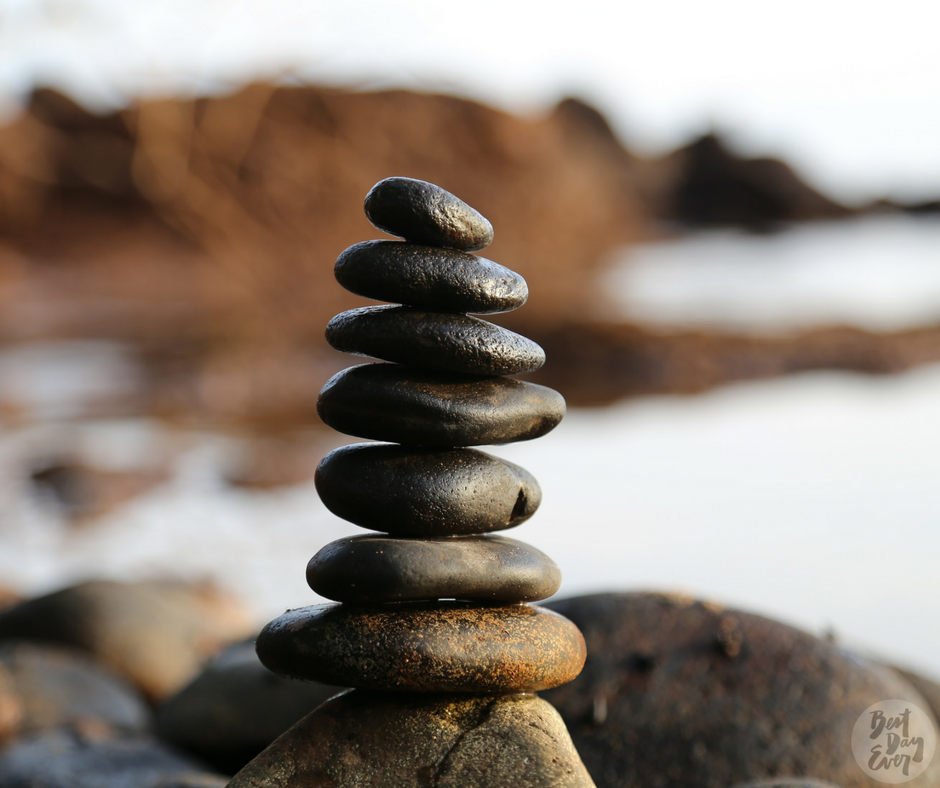Relaxation and Meditation

Relax. Close your eyes. Take a deep breath and inhale it down until you feel it in the very base of your lungs. Exhale slowly. Now do it again and bring your awareness down to your feet. Explore them with your mind. Feel any tension in your feet? Inhale deeply, then slowly exhale while you release that tension. Now bring your attention to your legs. Feel any tension or tiredness there? Inhale, then slowly release the tension in your legs as you exhale. Follow through on each section of your body, moving upward slowly, until you’ve exhaled all stress, all tension and all anxiety.
Hmmm. Feel anything? Something that perhaps feels unusual yet strangely familiar? Could it be that you’re feeling relaxed for the first time in a long time?
Just about everyone cops to feeling overly stressed due to work, family problems, financial issues, relationship challenges, and the list goes on and on. But ironically, far too many of us (Best Day Ever folks included) are so concerned about maintaining good health that we’ve actually developed anxiety and stress over the subject, unwittingly creating a whole new set of wellness issues. Talk about self-defeating!
The ability to relax and control stress is as important as every other step towards optimal health and wellness. Stress throws off your body’s various fine-tuned processes, weakens the immune system and creates illness. It also worsens any condition (or pre-condition) you may already have. Conditions related to stress include (but are certainly not limited to): ulcers, heart disease, gastrointestinal ailments, asthma, diabetes, memory loss, depression, reduced learning capacity, etc. Combat stress, however, through the process of relaxation, and you decrease stress’s impact on your body and mind.
The Mayo Clinic suggests that relaxation reduces the negative effects of stress by:
- Slowing heart and breathing rates
- Lowering blood pressure
- Increasing blood flow to major muscles
- Reducing chronic pain
- Improving concentration and confidence levels
- Reducing anger and frustration
One of the kindest things you can do for yourself is to learn to recognize the first signs of stress. Discover what your own unique warning signals are. Maybe it’s irritability or sleeplessness. Maybe you start craving ice cream, pasta, or your mother’s old-fashioned pot roast. Once you recognize the signs of oncoming stress…do something about it!
Here are some easy relaxation techniques:
- Drink some warm chamomile tea (the “sleepy time” tea), caffeine-free green tea (which contains theanine that promotes relaxation) or the old stand-by warm milk (which contains the relaxing amino acid tryptophan).
- Listen to your favorite music, especially slower music or nature sounds. Music therapy relaxes muscles, calms the mind, lowers blood pressure and slows breathing and heart-rates. It has also been known to lessen anxiety related to medical procedures.
- Take a long, warm bath. Add chamomile or lavender tea—or their essential oils—to the water, along with some bath salts, and you’ll be floating in relaxation heaven.
- Retreat to whatever space you’ve created in your home that serves as your “sanctuary.” Turn off the phone, shut down the computer and put a “do not disturb” sign on the door.
- Take a walk or do some moderate exercise (especially yoga or tai chi), both of which reduce stress while elevating happy-making endorphins.
One of the oldest—ancient, in fact—forms of relaxation is meditation. While meditation has been linked to some pretty amazing self-healing effects, the effect most studied and documented is its stress-reducing ability. The Mayo Clinic suggests that your mind and body can experience positive benefits from as little as just 10 minutes of meditation.
Although meditation takes different forms and may follow different philosophies, all definitions seem to include some basic elements, such as turning off the chatter in your mind, finding a still place deep within you, learning to direct your attention precisely where you want it, and discovering contentment in the silence and space of being “in the moment.” Jeffrey Gitterman, an award-winning financial advisor who knows a thing or two about stress, says that “with meditation, the more we practice, the more access we gain to the stillness and power that lies beyond our racing minds.”
It would be hard to find fault with a practice that enables the mind to take a break in order to rest and rejuvenate. Studies indicate that meditation helps with many of the same conditions that other stress-reduction techniques affect, including allergies, pain, fatigue, anxiety disorders, heart disease, insomnia and substance abuse.
Meditation:
- Increases serotonin production that regulates mood, sleep and appetite.
- Enables “mind restructuring” that improves concentration, observation skills and emotional strength.
- Lowers blood pressure, heart and respiratory rates.
- Increases blood flow while lessening the “fight or flight” response.
- Creates a sense of calm, peace and balance.
Meditation can take place anywhere you wish. You may prefer the stillness of your room, a nature walk, lying in the tub focusing on love and gratitude, kneeling in prayer, humming a song or hymn, enjoying a massage or even having a pedicure. It’s your inner world, visit it whenever and wherever you like! I’m pretty sure if my previous forays into meditation had included a pedicure that I would have done much better with it.
To help put you in the mood for meditation, here’s a quote from meditation expert and author, Jon Kabat-Zinn, which beautifully captures the essence of meditation as well as an overall sense of health and well-being:
“Meditation is an act of love, an inward gesture of benevolence and kindness toward ourselves and toward others…resting in awareness in any moment involves giving ourselves over to all our senses, in touch with inner and outer landscapes as one seamless whole, and thus in touch with all of life unfolding in its fullness in any moment and in every place we might possibly find ourselves, inwardly or outwardly.”
Call to action: take some time for yourself! Pedicure. Hike. Time with friends. Add one thing to your month that you wouldn’t have done to relax and calm the mind. I’m adding in a pedicure with a friend. Join me in relaxing a bit more this month and take time to slow down. It’s good for you!
